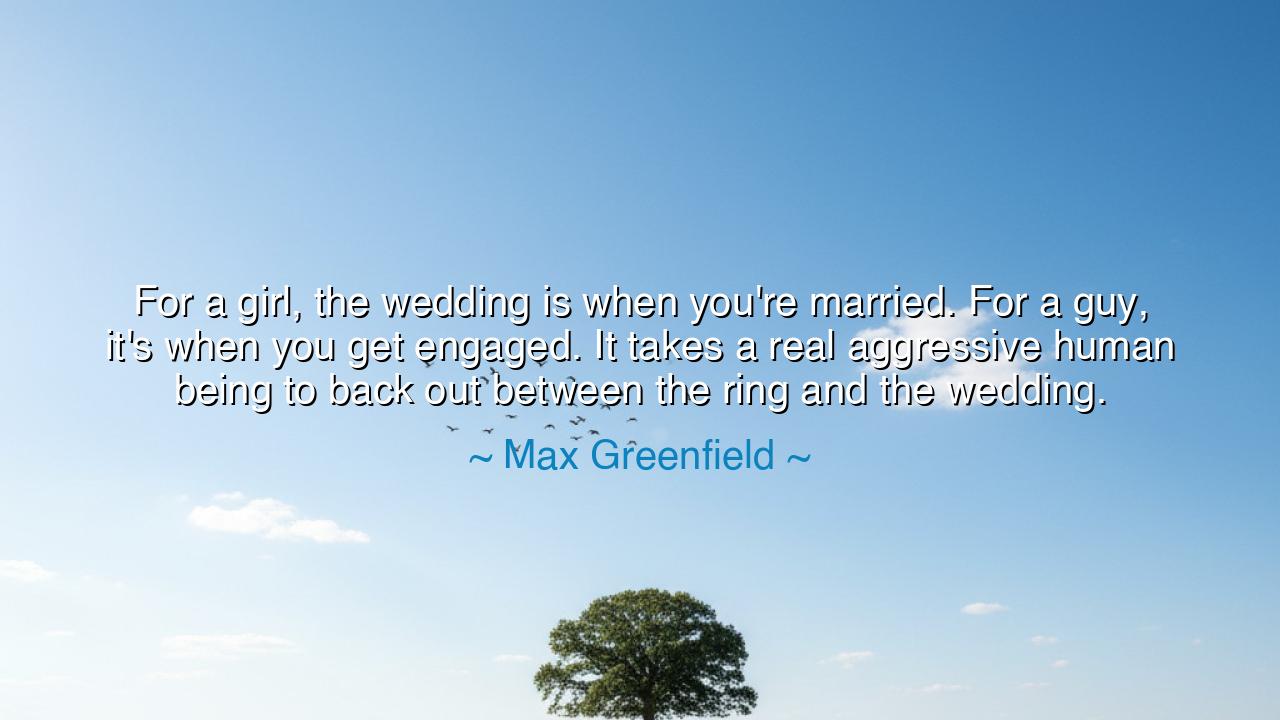
For a girl, the wedding is when you're married. For a guy, it's
For a girl, the wedding is when you're married. For a guy, it's when you get engaged. It takes a real aggressive human being to back out between the ring and the wedding.






In these candid and humorous words, Max Greenfield explores the psychology of commitment and the differing perceptions of marriage between men and women. He observes that for a girl, the wedding itself represents the culmination of love and union—the moment when life truly changes. For a guy, however, the engagement ring often carries the same weight, symbolizing the point of no return. His insight reveals the stages of expectation and highlights the courage it takes to navigate the period between engagement and marriage.
The origin of this reflection lies in the universal human experience of anticipation and decision-making. Throughout history, engagements and wedding ceremonies have served as markers of societal, familial, and personal expectation. In many ancient societies, the act of betrothal was nearly as binding as the wedding itself, with social and economic pressures compelling the couple to honor their commitment. Greenfield’s words capture this tension, emphasizing the rarity and boldness required for anyone to back out after a promise has been symbolically made.
History provides striking examples of this dynamic. Consider Marie Antoinette and Louis XVI, whose betrothal at a young age set in motion a lifetime of public scrutiny, duty, and eventual upheaval. The engagement itself held immense significance, shaping personal and political destinies long before the wedding day arrived. To retract from such a promise would have required extraordinary audacity, illustrating Greenfield’s point that only a truly aggressive human being could defy the social and emotional gravity of the period between engagement and marriage.
Greenfield’s observation also speaks to the differences in perception between genders. For women, the wedding is a moment of transformation, a sacred ritual that sanctifies the relationship. For men, the engagement may signal both responsibility and opportunity—a point at which the commitment is symbolically formalized. This distinction has persisted across cultures and eras, reflecting differing social expectations, emotional frameworks, and cultural scripts that shape how the sexes approach the milestones of love and union.
Ultimately, this quote is a meditation on courage, commitment, and societal norms. Greenfield reminds us that the act of breaking a promise, especially between ring and wedding, is not only emotionally fraught but historically rare, requiring a boldness that few possess. Let this teaching endure: the stages of engagement and marriage are laden with meaning, expectation, and responsibility, and navigating them with honor and courage is one of the oldest and most profound human challenges.






TNLe T. Tuong Nhu
This quote made me laugh, but it also reveals an interesting double standard. It suggests that women emotionally invest fully after saying 'yes,' while men feel the gravity of commitment much earlier. I’m curious if that’s really about gender or personality. Do people, regardless of gender, just experience emotional readiness for marriage in completely different ways?
DADo Thi Dieu Anh
There’s humor in this observation, but also a subtle truth about how social pressure works differently for men and women. I wonder if it’s because women are taught to see marriage as a goal, while men are taught to see it as a leap. It raises the question—why does the idea of 'backing out' even exist in something that’s supposed to be about love and choice?
SGShin'n Gucci
I think this quote captures a kind of cultural stereotype about how men and women process relationships. For women, the wedding represents fulfillment; for men, the engagement marks the decision point. But it also makes me question how fair that generalization is today. Are modern relationships shifting away from these gendered timelines, or do traditional mindsets still dominate our perceptions of commitment?
TDTran Huynh Tan Dat
This quote is both funny and thought-provoking. It plays on the different emotional timelines men and women often experience in relationships. I can’t help but wonder why commitment feels 'real' at different stages depending on gender. Is it social conditioning, or do men and women just approach emotional milestones differently? It’s an interesting reflection on how expectations shape the way we define commitment.